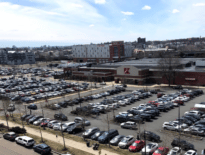A new poll of Massachusetts residents suggests the state could be heading for a crisis in the rental housing sector.
Between April and June, 29 percent of renters in Massachusetts missed paying at least some rent, according to a survey by the well-respected MassINC Polling Group. Asked whether they would be able to make rent payments if their current economic situation continues, only 67 percent said they could continue to pay in full for another one to two months and 57 percent said they could pay in full if their situation continues for another three to four months.
MassINC polled 1,531 Massachusetts residents between May 20 and May 25. Survey data was weighted to be representative of the state’s larger population.
Only 35 percent of renters and 40 percent of homeowners surveyed said the terms of their lease or mortgage had been modified due to the COVID-19 pandemic. Most renters who have missed payments said their lease terms had not changed. Only 21 percent of renters surveyed said it was “very likely” they will be able to catch up on missed rent payments by the time the state’s eviction moratorium ends, likely in August. Another 58 percent said they were “somewhat likely” to be able to do so.
In a webinar explaining the survey data Wednesday, MassINC Polling Group President Steve Koczela said survey data showed the state’s renters were hit disproportionately harder by the waves of layoffs that have hit the state thanks to the pandemic. Renters and those who live in lower-income households are more likely to be furloughed or unemployed, the survey found. Part-time workers, young people and those with less education are also more likely to say they have missed a rent or mortgage payment. In addition, 29 percent of renters surveyed reported struggling to get enough food, compared to 12 percent of homeowners.
Rental shortfalls appear to be hitting different segments of the multifamily housing industry in different ways.
The National Multifamily Housing Council, a trade group whose membership is dominated by larger, corporate developers who typically own higher-end, market-rate buildings, reports its members’ rent collection rates have dipped only slightly on a year-over-year basis in April, May and June. Greater Boston Real Estate Board President and CEO Greg Vasil told Banker & Tradesman his organization’s members – who also skew larger – are reporting they “are getting by at the moment.”
However, the executive director of MassLandlords, whose membership skews towards smaller landlords, said internal surveys suggest its members are missing around 19 percent of the rent they would have collected between March and May, and the share of members who reported tenants paying some or none of their rent jumped from 23 percent to 45 percent, with six percent saying they received no rent payments in May.
“In the aggregate, if you’re an economist, you can look at that and say ‘that’s not so bad,” MassLandlords Executive Director Doug Quattrochi said. “But it’s no consolation for the people who are experiencing 100 percent loss.”
Much of the housing policy discussion on Beacon Hill focused on boosting a state emergency housing assistance program called RAFT, or Residential Assistance for Families in Transition. However, Quattrochi said he doubted the program could provide enough money fast enough to keep many small landlords from going under.
“If our survey results scale up to the entire industry, there’s half a billion dollars in rent missing, here,” he said.









